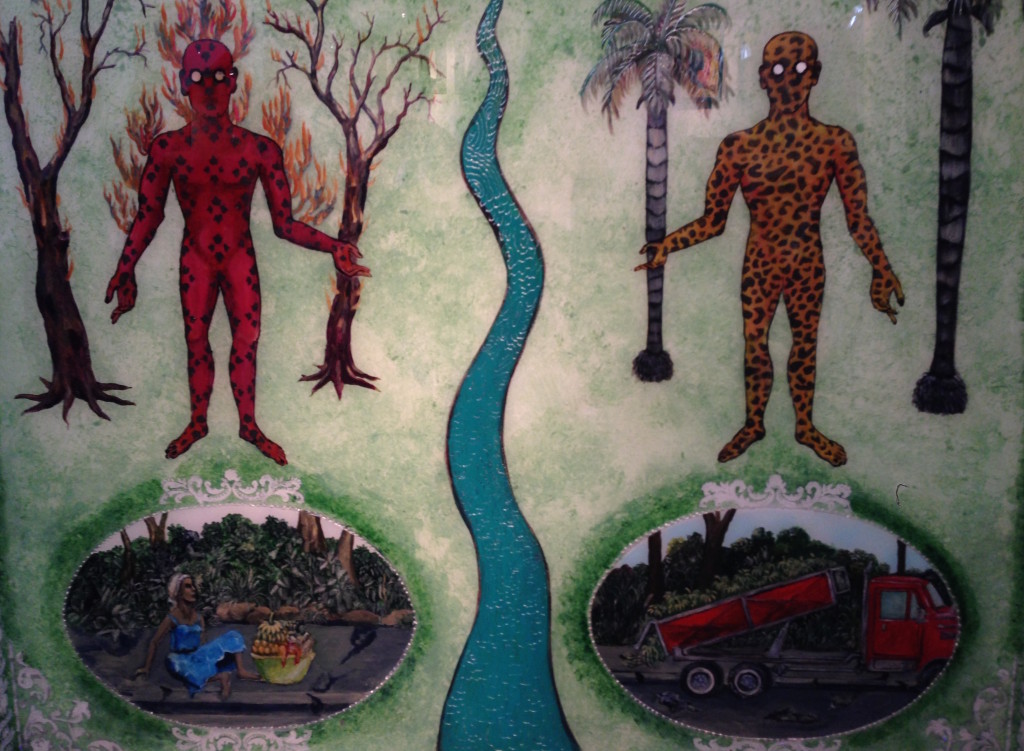Miami is the site for Embark, the 2015 Independent Sector Annual Conference and Public Policy Action Institute. The Conference is a critical one for Independent Sector coming shortly after its former and long-time President and CEO Diana Aviv departed to head Feeding America and during a time when Independent Sector is attempting to define its leadership role in the nonprofit sector.
The Independent Sector national conference isn’t just a unique meeting of bright minds dedicated to the common good. It’s a rare opportunity where the outcomes can be truly transformative for the entire charitable sector. It’s where the best and brightest from nonprofits, foundations, and corporations of every size come together to collaborate, network, and learn about the emerging national and global trends that affect us all. And, it’s an immersive cultural experience, where the art blends with ideas and action to spark innovation and create a vision for a better future.
I had a great time participating in opening plenary – Thread by Thread: Creating a Better World Together – which reviewed the 14 community conversations called “Threads” Independent Sector launched earlier this year to explore the nonprofit sector’s collective ability to solve the world’s greatest problems in coming years by examining trends, obstacles, and solutions. Another highlight for me was briefly talking to one of our most important civil rights leaders and treasures Bob Moses.
Public Policy Action Institute (pre-conference)
Intercontinental – Miami
The Future of Independent Sector’s Public Policy Work
- New IS Vision & Purpose: “We envision a world of engaged individuals, robust institutions, and vibrant communicates working together to improve lives and the natural world, and strengthen democratic societies. To help create this future, we lead and catalyze the charitable community, partnering with government, business, and individuals to advance the common good.”
- Public policy is one of the best levers we have for shaping our future | but more collaboration & transparency needed- S Vargas, Minneapolis Foundation
- While more collaboration with government and business is of course necessary, we must be prepared to attack both – J Masaoka, CalNonprofits
- Policy makers need to be educated about the role and impact of the nonprofit sector, including on the economy
- IS must lead a critical conversation on race; community organizations of color have become increasingly important as brokers of political power; diversity is a systemic problem within the nonprofit sector that must be addressed with sufficient attention and resources now
Advocate-Artist Partnerships
- Art must be part of our conscious effort to advocate for social change; I learned that I had to reach people not only through their heads, but also through the hearts (e.g., Manifest Justice) – S Hawkins, Amnesty International USA
- Public art increasing civic engagement – Next Stop: Democracy!
- Art and advocacy shutting down a notorious “supermax” prison – Creative Time Reports
- Art can bring out the anger and passion in the advocacy that may otherwise be lacking
- Tough nonprofit innovation decision – go together for greater immediate impact or go alone for cleaner data for future funding – L Sylvia, Next Stop: Democracy!
Understanding Nonprofit Tools in the Policy Toolbox
- Basic legal issues related to lobbying and electioneering by exempt organizations (note that influencing an administrative agency on regulations under existing statutes is almost always not lobbying); short summary of issues for affiliated organizations – E Kingsley, Harmon Curran
- Private foundations can support lobbying and advocacy and 501(c)(4) organizations (see, e.g., Private and Public Foundations May Fund Charities that Lobby, Why Should You Support 501(c)(4)s? – Bolder Advocacy, Alliance for Justice)
- Critical to educate the board on the fact that charities can lobby and often should; check out Stand for Your Mission – M Turner, Colorado Nonprofit Association
- Keep engaging the board or they may be active only for a crisis (because they may otherwise not recognize the difference between importance and urgency)
- If targeting elected officials, also speak to the people who those officials are listening to – E Engelhard, Fair Food Network
- Implementation is as important as legislation
Challenging the Overhead Myth
- BBB Wise Giving Alliance, Guidestar and Charity Navigator were signatories to letters to nonprofits and to the public identifying the Overhead Myth – the false conception that financial ratios are the sole indicator of nonprofit performance – A Taylor, BBB Wise Giving Alliance
- Arguing about overhead is like arguing between VHS and Betamax; need to focus on outcomes and impact – D Greco, Social Sector Partners
- Do we have to decouple trust (e.g., fraud issues) from effectiveness/efficiency (e.g., impact issues) in funding policies and public policies? – N Deychakiwsky, CS Mott Foundation
- Recommended read: The Nonprofit Starvation Cycle (SSIR)
- We should be talking about the new landmark law – OMB Guidance – pursuant to which the federal government finally recognizes that it relies on nonprofits and that funding indirect costs is necessary to delivery the services government is funding; we need to educate the sector and all levels of government receiving and passing through federal funding which are subject to the requirement that government pay indirect costs of nonprofits carrying out projects funded by federal contracts and grants; check out recommended next steps for leaping beyond the Overhead Myth discussion here – T Delaney, National Council of Nonprofits
Nonprofit Votes Count
- Communities with low voter turnout get ignored in the political process. Who are the non-voters? Many of the people we serve. – B. Miller, Nonprofit VOTE
- The Koch brothers and George Soros each have one vote. Is that true? – J Martel Gaiter, Volunteers of America
- Community organizations need to recognize and take seriously their positions as representatives of their communities and engage their constituents; the organization’s advocacy will be so much stronger when engaged in collectively with their constituents – J Davila, Hispanic Federation
Leveraging Grassroots Movements to Achieve Long-Term Change (joint program with NGen)
- Amazing conversations with pioneer and young social justice leaders: Bob Moses (Algebra Project), Umi Selah (Dream Defenders), Julieta Garibay (United We Dream), Mee Moua (mod.)
- The job of next gen leaders is to push our country forward again, on civil rights – B Moses, civil rights giant and architect of Mississippi’s Freedom Summer
- “We the people …” – Civil rights movements have expanded who the “people” includes, but children are still being left behind; Jim Crow is still with us in education
- Advocacy organizations arising from seminal events often don’t survive for lack of infrastructure and unrealistic expectations – U Selah
- “Power concedes nothing without a demand” – J Garibay
Federal Policy Forecast for the Nonprofit Sector
- Congress and White House Reach Tentative Budget Deal (NY Times, 10/26/15)
- Big tax reform not expected until after election, but expect a big tax deal early in the next presidential term
- Tax extenders – expect activity close to the year-end; the nonprofit sector needs to get the charitable provisions to show and build on its political strength
- Treasury talking about not finalizing any regs until 2017
- In election, control of the Senate will be up in the air (GOP defending 24 seats; Democrats defending 10)
- Nonprofits need to be aware of state-federal policy interactions; for most organizations, it may be more realistic to influence state policy – S Brown
Miscellaneous
- I’m tired of being on diversity committees filled with people of color that provide suggestions to non-diverse (white) boards and feel like they are asking for some type of favor to be granted to them – Gaiter (paraphrased)
- “If I hear again to collaborate, get out of silos, think out of the box, focus on results or other abstract cliche my head might bust” – Masaoka
Embark – Independent Sector Annual Conference
Miami City Ballet
Thread by Thread: Creating a Better World Together
- Released on 10/27/15: Threads: Insights from the Charitable Community Report – Opportunities and challenges identified during Threads, Independent Sector’s coast-to-coast community conversations.
- “In the eyes of a millennial, philanthropy is not something you only do when you are old.” – R Chong
- My summary of the Oakland Threads conversation here.
- The nonprofit sector should be at the front lines of the racial justice movement; number 1 concern of nonprofits is instability of funding caused by structures that cause them to compete not cooperate (we talk collaboration but don’t walk it); we’re creating a new form of tribalism whereby we surround ourselves w/ like-minded points of view; workforce and talent issues are a clear priority. – D Aviv (highlighting trends from across the country)
- To most effectively utilize swarms (e.g., #BlackLivesMatter, #JeSuisCharlie, #IceBucketChallenge, #KONY) to build sturdy movements, need to have multi-organizational leadership (preferably with collaborations planned in advance), defined policies to support, and resources ready to be mobilized
Redefining Leadership for a New World
- Bob Moses distinguishing movement leadership vs organizational leadership in fascinating historical context – see Student Nonviolent Coordinating Committee – and recommending NGens understand more about leadership in America by getting to know Ella Baker
- Shared leadership = shared goals + shared accountability + deep trust & deep relationships + humility – S Brenner
- Ugly conversations among collaborators (with mutual trust) can catalyze dialogue, understanding & advancement – K Moodie
- The world doesn’t get better with lost of good intentioned, poorly informed people – S Ishoof (advocating for Millennials to engage their curiosity and not just their empathy)
Red, White, and on the Brink
- 28 million Latino voters eligible to vote in 2016 (5 million more than in last election); expect greater mobilization around immigration and negative rhetoric – ME Salinas (also see Hispanics Could Hold Sway Over the 2016 Election)
- Republicans have been defined by what they oppose, which explains how outsider candidates have attracted significant attention –J Woodruff
- Authenticity and trustworthiness of candidates come through over the course of a campaign; what you see is what you get (if you’re paying attention)
- Structural divides in the country – media is part of the blame, inflaming fears of the other party/side; also, people watch the news they want to hear, whatever fits into their mold
- Trevor Potter gave a compelling presentation on the reality of dark money in politics and need for campaign finance reform:
- 80% of Republicans and 83% of Democrats all agree – Supreme Court’s ruling “that corporations and unions may spend unlimited amounts on political causes” (Citizens United) should be overturned
- 87% of all Americans agree – “Campaign finance should be reformed so that a rich person does not have more influence than a person without money”
- 59% of Americans agree – “Political system is broken; we just need to start over”
- 1/4 of 1% of Americans donated $200 or more to any federal campaign/party/PAC; only 304 people gave 70% of all individual superPAC money
- 501(c)(4) campaign spending grew from $3M in 2004 to more than $250M in 2012 #darkmoney
- Not since before Watergate have so few people and businesses provided so much early money in a campaign NY Times
- “People think the FEC is dysfunctional. It’s worse than dysfunctional” – Federal Election Commission Chair NY Times
- Model day of a member of Congress (leaked) includes 4 hours of call time (i.e., fundraising is by far the most time a Congress member is expected to devote to her or his job) – see http://bit.ly/1S9m8BP
- Need to restore confidence of citizens in public institutions; must make institutions worthy of confidence – John Gardner (founding chair of Independent Sector)
Post Racial America, Really
- So much institutional racism but hope from young courageous undocumented people demanding changes now – J Cartagena
- Wish we could be more proactive re: racial justice but too often events push us back into taking a defensive posture – J Kim
- “Post-racial” is an advertising term – T Shorters see There Is No Post-Racial America
- Inspiring arts & social justice program in Baltimore reaching out to children in communities of color and drawing in other communities because of the quality and approach – OrchKids – D Trahey
- Get laws passed but also hold people/institutions accountable for implementation (and engage communities to know how to keep them accountable)
- To get past good immigrant / bad immigrant framework, we need to be informed to call out faulty facts & approaches and bring up correct ones
- Systems and institutions are built in a way that works against racial justice; need to engage hearts and minds to get lasting change
- Recommended reference: Framing Public Issues – Frameworks Institute
Governance, Ethics and Principles for Success
- Principles for Good Governance and Ethical Practice dev 2007, rev 2015 (downloaded over 200,000 times) – some changes from 2007:
- Not only should nonprofits have a conflict of interest policy, boards should know how it would be enforced
- Data added as an asset and must be protected
- Full board should be engaged in executive’s compensation package
- Need “overhead” to make sure programs can operate sustainably
- Gift acceptance policy
- Governance 101 (but too many examples of failures): Board members – show up, pay attention, if you see something, say something – S Warren
- In governance, process is your friend – A Wallestad
- Consider data as not only an asset but also as a heavy responsibility (and therefore an associated potential liability) related to protection, including of personally identifiable information (“PII”)
- Need to limit access (e.g., typically, not all staff require or should have access to PII)
- Need to have policies; train and enforce policies
- Use permissions
- Use confidentiality agreements
- Check out Leading with Intent from BoardSource
Deep Dive Excursion
Visited History Miami, Freedom Tower, the studio of Edouard Duval-Carrié, and Little Haiti Cultural Center. Learned about the Pedro Pan story where “more than 14.000 Cuban youths who came to Miami (Dec. 1960 -Oct.1962) unaccompanied, were met by relatives, friends, or special agencies to be relocated in Miami and 30 other states.”
Edouard Duval-Carrié
John W. Gardner Leadership Awards Luncheon
- Michael Brown, co-founder and CEO of City Year, was honored with the 2015 John W. Gardner Leadership Award
At City Year, we’re working to bridge the gap in high-poverty communities between the support that students actually need, and what their schools are designed and resourced to provide. In doing so, we’re helping to increase graduation rates across the country, and changing the lives of the students we serve.
- Julieta Garibay, campaigns director of United We Dream, was honored with the 2015 American Express NGen Leadership Award
United We Dream is the largest immigrant youth-led organization in the nation. Our powerful nonpartisan network is made up of over 100,000 immigrant youth and allies and 55 affiliate organizations in 26 states. We organize and advocate for the dignity and fair treatment of immigrant youth and families, regardless of immigration status.
Closing Thoughts
Having a joint Public Policy Action Institute and NGen session featuring Bob Moses and Julieta Garibay set the tone for my experience at the Conference. IS and the broader nonprofit sector must focus on policy, and young people must be brought into the dialogue even as they set their own course. It’s easy to preach to the choir, but if we measured the impact we’ve been having on these issues (and shouldn’t somebody), we would be disappointed.
While much is said about older people failing to include younger people on boards and positions of executive leadership, it’s also worth noting that older people can’t simply buy into the rhetoric that the young people will change the world. Of course, they will. But those currently in positions of power and authority can’t be left off the hook of contributing to major changes now. And including diverse voices in the dialogue and decision-making. As I asserted in my rap, “Inclusion demands voice and authority.” And as Garibay powerfully stated: “We are all somebody, we deserve full equality – right here, right now.”



